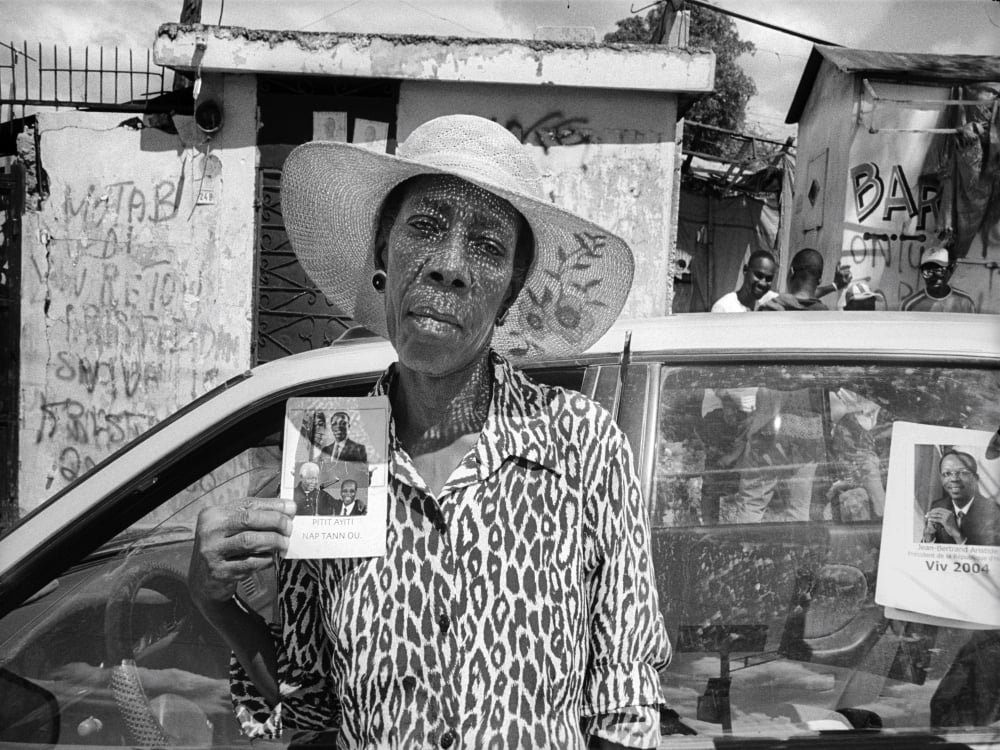I watched Vancouver director Elaine Brière’s documentary Haiti Betrayed last year, when it screened at KDocsFF in Vancouver. The film was initially released on the cusp of the COVID-19 pandemic, and public health restrictions put a pause on film screenings.
When I first viewed the film, I remember thinking, “how could it possibly get worse?” And, then it got much worse.
Today the island nation is, if not in full-scale collapse, extremely close to total disaster.
The role Canada played in the violent dissolution is not widely known, but Brière’s film remedies this with a close, careful examination of recent events.
The film also functions as an excellent primer on the history of Haiti. As the first Black republic founded by freed enslaved people, the Haitian revolution was based upon the ideals of freedom, justice and equality. But from the outset, the fledgling nation faced draconian challenges to its very existence.
The Tyee posed some questions to Brière about the film’s production, the challenges she faced in screening the film and what the future might hold for Haiti. This interview has been edited for length and clarity.
The Tyee: Your film presents an encompassing presentation of Haitian history. Given everything that has taken place recently in the country, what is the most immediate and pressing thing that Canadian audiences need to know?
Elaine Brière: Canada continues to back an unelected Haitian “government” controlled by some 20 families who form an oligarchy. These families and their political and gang proxies have run the country since the days of the Duvalier dictatorship, except during a decade of democratic government from 1994 to 2004.
In 2004, the U.S., France and Canada organized a coup that took out the elected government and restored the 20 families to power. In the past year the Canadian government has just begun to back away from supporting the family oligarchs whose grip on power has been disastrous for the Haitian people. Canadians need to pressure our government to stop propping up the oligarchy and instead actively support the progressive Alliance of Civil Society Groups coalition in Haiti which is working to organize a transition back to democratic government.
How did you initially come to make this film?
I went to Haiti in 2009 with my partner, David Putt, who was director of an NGO implementing clean water and sanitation projects. David’s group worked in the poorest parts of Port-au-Prince, often in the schools. Through these projects, I gained access to photograph the people there, and later during post-earthquake aid efforts which David helped organize (he was in Port-au-Prince when the quake happened in January 2010).
We learned from the Haitians in poor neighbourhoods, especially from schoolteachers, a very different version of the 1994-2004 governance and events surrounding the 2004 coup than the common narrative in the Canadian and U.S. press.
There was no Canadian media coverage of the Haitian majority who had supported the deposed government or [Canada’s] less than humanitarian role in the country, so I decided to make this film based on what I had heard from Haitians.
Canada was once seen positively by most Haitians, but this changed in the late ‘90’s. As one Haitian put it to me, “Canada has become the shoeshine boy to the [U.S.] emperor.”
The key incident that inspired me to make the film was my encounter in 2009 with a person I met in a major square in Port-au-Prince. I was taking photographs when a poor but neatly dressed older man approached me with his arms out, shouting in broken English. “Blan, blan, (foreigner) you don’t know what is happening here.”
He thought I was a journalist. I walked towards him, afraid that the UN soldiers patrolling the square would harass or arrest him. Taking off his hat, he spoke again: “They are killing us! We are poor people! Our life is very hard. Tell them, tell them what they are doing to us. Tell them to stop! Tell them to stop!” He began to cry.
I held his hand until he could compose himself. He put on his hat and slowly walked away.
During the film’s production, did you encounter challenges in gaining access to information, particularly around Canada’s role in undermining democracy in Haiti?
Yes, there were many challenges and essentially all doors were closed on what our role had been on regime change in Haiti. I could get neither interviews nor comments from key Canadian players at the time of the coup like then-Foreign Affairs Minister Pierre Pettigrew, former Foreign Affairs Minister Bill Graham and Special Envoy to Haiti Denis Coderre.
Most of my film footage of these officials was given to me by a U.S. journalist who interviewed many of the players in the immediate post-coup period.
Nor was I able to get comment from any of the former heads of NGOs based in Quebec, like Oxfam-Québec and the Canadian Catholic [Organization for] Development and Peace, which supported the regime change in 2004.
Associates made specific requests for information and/or comment from the government about a key planning meeting at Meech Lake in early 2003, where Canadian, U.S. and other foreign officials discussed regime change in Haiti (reported on only by L’actualite in March 2003) but the government declined to comment or provide information citing national security concerns.
Do you think Canadians are surprised that Canada would take such action, given the country’s reputation as a 'good cop' in international affairs? Have you encountered active resistance to screening the film?
Wherever I have screened the film, Canadians have been surprised. Our self-defined image as Canada being a “good cop” is deeply ingrained. The mainstream media tells us very little that is not in keeping with the “good guy” image of Canada in the world.
I was an activist on East Timor issues for two decades during the Indonesian occupation of Timor about which Canada was silent and that in some ways we abetted. I did a film on our role in East Timor which elicited similar surprise (Bitter Paradise: The Sell-out of East Timor).
Haiti Betrayed came out in 2020. COVID interceded for two years, preventing public screening. Haiti fell from view in those two years. It is only in the last six months, with Haiti in the news again, that there is broader renewed interest in the documentary.
I was unable to get it into any of the major film festivals in Canada including Hot Docs, VIFF, DOXA, the Victoria Film Festival. Nor has it screened on CBC or educational TV outlets. However, I did have some success in Quebec. The major French network TV5 translated the film into French and broadcast it in Quebec, France and other francophone countries.
The film was the opening night film at the 2022 FICiP International Political Film Festival in Buenos Aires, Argentina (with Spanish subtitles gifted by Mexican translators).
Canada is seen less favourably, and our policies are more scrutinized in the third world than here at home. The documentary has been picked up by a number of U.S. and Canadian university libraries where I know it is used as a teaching aid.
The broader Canadian public, if they have an interest in Haiti, clings to the idea that we have tried to help Haitians, but Haiti is irredeemable despite our best efforts. There is a well cultivated perception that Haiti is a basket case, ungovernable. There is little sustained interest in Haiti. The exception is the Haitian-Canadian community from whom I have had many favourable comments about the documentary.
What lessons does the destruction of Haitian democracy offer to people currently fighting for social justice and democratic reform around the globe?
Haiti is a textbook case of white colonialism, past and present. Daniel Foote, a retired U.S. diplomat and formerly Joe Biden’s special envoy to Haiti until he resigned in protest, has been outspoken in his criticism of U.S. policy as racist and disastrous for the Haitian people.
Canada’s role in Haiti has been self-serving and much more about earning points with our U.S. political masters than about the welfare of Haitians. Bill Graham, Canada’s minister of foreign affairs from 2002 to 2004 said as much: “There is a limit to how much we can constantly say no to the political masters in Washington.” Graham told interviewer Janice Stein of the Munk Institute, “Eventually we came on side on Haiti, so we got another arrow in our quiver.”
Haiti and Haitians provide an inspiring example of people fighting for social justice against impossible geopolitical odds. Haiti challenged the colonial system like no other western colony in becoming the first independent Black republic in the world. It was the first successful rebellion by slaves in world history, though at a cost of one third of the population during 14 years of war climaxing in defeat of Napoleon’s army of reoccupation.
Haiti was the first third-world country to be forced into permanent indebtedness when France for 127 years extorted “reparations” from Haiti for loss of slaves, until 1952. But it was also the first to demand reparations from their former colonizer.
The situation in Haiti again looks impossible. But in the face of the current terrible violence in Haiti by gangs linked to the oligarchs and the disasters of the last 20 years, Haitians continue the fight for their basic human rights and a functioning democracy.
What do you foresee for the country’s immediate future?
The situation in Haiti will continue to be terribly perilous during the near and mid-term. But I have no doubt that progressive forces in Haiti will continue to press for basic social justice and a return to democracy. Haitians are indomitable.
It is our duty as Canadians to support those progressive forces and use our government influence to counter the power of the destructive oligarchy that has driven Haiti into the mess it is in today.
‘Haiti Betrayed’ screens at the VIFF Centre in Vancouver on Jan. 28. Get tickets. ![]()
Read more: Rights + Justice, Federal Politics, Film
















Tyee Commenting Guidelines
Comments that violate guidelines risk being deleted, and violations may result in a temporary or permanent user ban. Maintain the spirit of good conversation to stay in the discussion.
*Please note The Tyee is not a forum for spreading misinformation about COVID-19, denying its existence or minimizing its risk to public health.
Do:
Do not: